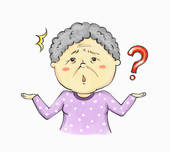ADHD in the Geriatric Population
“I keep losing everything”, an elderly woman says to you. This could be a family member or a friend that you are visiting, who it seems is experiencing typical aging impairments. “Where are my sandals, again?” she asks, appearing frazzled. After glancing around the room, you respond, “Oh, the sandals are right behind you.”
Next, this elderly woman tells you how hard it is for her to finish tasks like folding her laundry or unpacking suitcases after trips. In this moment, you think to yourself how difficult it must be to experience memory challenges. You may even wish you can do something about it but dementia and other cognitive deficits cannot be prevented.
What if I told you this elderly woman could potentially meet criteria for ADHD? What if I told you, there really was something that could be done to help her live a higher quality of life?
But wait, ADHD is only for children….. right?
ADHD is typically diagnosed in children and while around 2/3 of the cases continue into adulthood, if an older person was never diagnosed before, it is rare that a doctor looks out for it. Most of the time, doctors who come across elderly patients who have never been diagnosed with ADHD, will look too see if their symptoms match for Alzheimer’s or dementia or other aging related impairments.

Recently, there have been more stories of people at older ages discovering for the first time in their lives that they have ADHD. In one NY times article, a psychiatrist diagnosed a woman in her eighties with ADHD, provided her with the right medication and her symptoms were greatly alleviated.
She had went from being forgetful, losing things and being distracted to becoming more organized and able to focus. Receiving the right treatment and medication for ADHD at an older age can drastically change an individual’s life and allow them to take control and make great changes.
This remains a large issue as when many of these elderly people were children, ADHD was not that well known and not even diagnosed enough in children. As ADHD has become increasingly diagnosed and researched, a whole cohort of people have been isolated from the diagnosis and treatment process.
Mild Cognitive Impairment (MCI) vs ADHD

Normal aging impairments develop naturally as an individual gets older but ADHD is a disorder that starts at birth. The symptoms can manifest differently or be exacerbated at different stages, but the ADHD must have always been there while aging impairments originate later on for the first time.
Mild cognitive impairments (MCI) refer to the transitional stage between aging and Alzheimer’s onset and is a type of dementia. Someone with MCI will have trouble remembering things, trouble with attention but still manage to do little day to day tasks. About 10-15% of elderly people with MCI go on to develop Alzheimer’s.
Inattention or Aging Impairments
Little research has investigated ADHD in the elderly population because of the strong association ADHD has with being diagnosed in children. ADHD presents differently across the stages of life and children typically exhibit hyperactivity, impulsivity and inattention.
As a person gets older, the hyperactive and impulsive symptoms tend to subside but he or she will continue to experience inattention. This symptom of inattention, which causes someone to be distracted, unorganized and forgetful, can be confused for other disorders. In elderly people, the symptom of inattention can be mixed up for Alzheimer’s as both can cause cognitive impairments.
An elderly person who experiences memory issues and forgets things rapidly, fits the stereotype of an individual with Alzheimer’s. Also, one of the requirements for an ADHD diagnosis is that the symptoms have to have been present from before the age of seven. Many elderly people would not remember this far back and also doctors are not asking questions regarding ADHD because they do not think to diagnose someone older with ADHD.
Treatment for ADHD in the Elderly
While medication is the go to treatment for ADHD in most cases, this may not be true with elderly people. Medication can induce side effects and it is important to make sure that the medication would not cause any harm. It is important to consult with your psychiatrist and doctor to find the right dosage and to see if medication can alleviate symptoms.
Elderly people with an initial diagnosis of ADHD can improve their quality of life and over all well being as they address this disorder. Even though they will be getting a later start at managing their ADHD, they will discover how much more they are capable of achieving with the proper treatment.

Work Cited
https://www.mdedge.com/clinicalpsychiatrynews/article/104054/alzheimers-cognition/adhd-elderly-unexpected-diagnosis
https://www.additudemag.com/adhd-late-diagnosis-elderly-treatment-options/
https://www.additudemag.com/inside-the-aging-adhd-brain/
https://nanfoundation.org/neurologic-disorders/dementias/what-is-mild-cognitive-impairment
https://well.blogs.nytimes.com/2015/09/28/is-it-alzheimers-or-a-d-h-d/
Ivanchak, N., Fletcher, K., & Jicha, G. A. (2012). Attention-deficit/hyperactivity disorder in older adults: prevalence and possible connections to mild cognitive impairment. Current psychiatry reports, 1-9.
